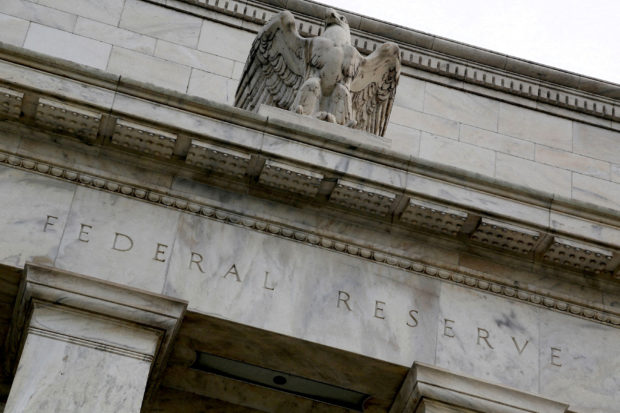End is in sight for global rate hiking cycle

An eagle tops the U.S. Federal Reserve building in Washington, July 31, 2013. REUTERS/Jonathan Ernst
LONDON – Big central banks are closing in on the end of their rate hiking cycles, starting to surprise markets as their outlooks on when and how they will cease monetary tightening diverge.
The U.S. Federal Reserve has trounced hopes for a prolonged pause, while Switzerland on Thursday unexpectedly kept rates steady and the Bank of England also chose to leave rates unchanged as latest data suggests inflation pressures easing.
So far, nine developed economies have raised rates by a combined 3,965 basis points (bps) in this cycle. Japan is the holdout dove.
Here’s where central banks stand, ranked by how much they have hiked so far this cycle:
1) United States
The U.S. Federal Reserve held interest rates steady at 5.25 percent-5.5 percent on Wednesday but said rates may rise again this year to contain inflation.
Markets are not so sure, with futures pricing a roughly 50 percent chance of another quarter-point hike by year-end. Many economists suspect the rate hiking cycle is over even if the Fed remains hawkish for now.
2) New Zealand
The Reserve Bank of New Zealand lifted its cash rate to a 14-year high of 5.5 percent in May and has kept it there since.
A front-runner in withdrawing pandemic era stimulus, the RBNZ has pushed out when it expects to start cutting borrowing costs to 2025.
3) Britain
The Bank of England held interest rates at 5.25 percent on Thursday, citing increasing signs of the economy slowing, but left the door open to further hikes.
Sterling fell sharply after the move and interest rate futures showed traders believe there is a 70-percent chance the BoE will leave rates unchanged in November, compared with around 50/50 before the decision.
4) Canada
Bank of Canada Governor Tiff Macklem said on Sept. 7 that monetary policy may not be tight enough to return to target.
His hawkish remarks came a day after the Bank of Canada kept its key rate at 5 percent, but said it could hike again should price pressures persist. Inflation has remained above the bank’s 2 percent target for 27 months.
5) Euro zone
The ECB raised its key rate to 4 percent on Sept. 14, the highest level since the euro currency was launched in 1999, but signaled this could be its final move in a more-than year-long fight against inflation.
Economists polled by Reuters believe the ECB is done hiking rates and will stay on hold until at least July 2024.
6) Norway
The Norges Bank raised its key rate by 25 bps to 4.25 percent on Thursday, but in a surprise move flagged another hike was likely in December.
Core inflation unexpectedly declining to 6.3 percent in August had boosted expectations that Thursday’s hike would have been Norway’s final one. But underlying price growth is still well above the bank’s 2 percent target and now seen at 4.7 percent next year, higher than the Norges Bank previously expected.
7) Sweden
Sweden’s central bank raised its key policy rate by 25 bps to 4 percent on Thursday, as expected, and said more tightening may be needed to bring inflation back to 2 percent.
The Swedish crown has tumbled around 7 percent against the euro in 2023, bolstering the case for rate rises, and inflation was running at 4.7 percent in August. But policymakers also face a sharply slowing economy, which the government expects to contract 0.8 percent this year.
8) Australia
Minutes from the Reserve Bank of Australia’s September meeting showed the central bank considered a 25 bp hike but opted to keep rates steady at 4.1 percent for a third consecutive meeting, the last under former Governor Philip Lowe.
Lowe’s successor, Michele Bullock, is expected to strike a similar tone on Oct. 3, with markets pricing in one more rate rise by early 2024.
9) Switzerland
The Swiss National Bank unexpectedly kept interest rates on hold on Thursday at 1.75 percent, after three consecutive months of inflation within its 0 percent to 2 percent target range.
Yet SNB Chairman Thomas Jordan did not rule out a further interest rate hike. “We will not hesitate to tighten our monetary policy further if necessary in order to keep inflation below 2 percent on a sustainable basis,” he said.
10) Japan
The Bank of Japan, the world’s most dovish major central bank, unveils its latest decision on Friday.
The consensus is for no change in its current stance, although Governor Kazuo Ueda suggested in an interview that the central bank’s negative interest rate policy could end within this year.
A majority of economists said in a Reuters poll on Thursday that BoJ will end its negative rates policy next year.